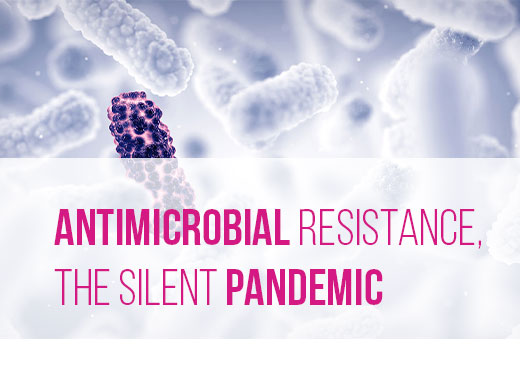
The World Antimicrobial Awareness Week (WAAW) is celebrated annually globally from 18th to 24th November and the theme for this year’s celebration was, “Spread Awareness; Stop Resistance.” The WAAW week was climaxed at UGMC with a forum that was held at the main auditorium of its Medical Training and Simulation Centre (MTSC) on 24th November 2021. The WAAW is an initiative of the World Health Organization (WHO) as part of measures to curb Antimicrobial Resistance (AMR) worldwide.
The World Antimicrobial Awareness Week (WAAW) is celebrated annually globally from 18th to 24th November and the theme for this year’s celebration was, “Spread Awareness; Stop Resistance.” The WAAW week was climaxed at UGMC with a forum that was held at the main auditorium of its Medical Training and Simulation Centre (MTSC) on 24th November 2021. The WAAW is an initiative of the World Health Organization (WHO) as part of measures to curb Antimicrobial Resistance (AMR) worldwide.
In his welcome remarks, Director of Pharmacy, Dr. George Amoateng, explained that antimicrobials are the main therapeutic agents used in the treatment of various infections. He also said that antimicrobial resistance is currently a universal problem due to misuse which occurs when there is self-medication of antibiotics by individuals, incorrect choice of prescriptions, or inappropriate dose and/or duration of prescriptions. He explained that in animals, the development of antimicrobial resistance is due to the wrongful use of antibiotics as supplements to maintain their health and improve productivity. He also spoke briefly on the emergence of resistant strains globally and in Ghana in particular.
Dr. Amoateng indicated that some consequences of antimicrobial resistance included increasing financial burden, increasing cost of healthcare, the strain on the healthcare system due to increased workload, increased government/insurance costs, development of more resistant strains and increasing morbidity and mortality.
Dr. Desmond Kwakye, a pharmacist at UGMC delivered the first presentation on the topic, “Prevention of antimicrobial Resistance: A Shared Responsibility”. According to him, this phenomenon is the adaptation of microorganisms to protect themselves from the effects of antimicrobial medications and this makes them resistant to previously effective antimicrobials. He further explained that this phenomenon is accelerated by the overuse and inappropriate use of antimicrobials.
The second presentation was by Nana Ama Buadiba Osei, another pharmacist at UGMC who spoke on the Response to Antimicrobial Resistance (AMR). According to Ms. Osei, the key objectives of the global response to AMR include; improving awareness and understanding of antimicrobial resistance, strengthening surveillance and research, reducing the incidence of infection, optimizing the use of antimicrobial medicine in human and animal health, and developing the economic case for sustainable investment in countering AMR. She further stated that in Ghana, the strategic objectives of the AMR National Action Plan are:
· Improving the awareness and understanding of antimicrobial resistance through effective communication, education and training.
· Strengthening knowledge through surveillance and research.
· Reducing incidence of infection through effective sanitation, hygiene, IPC measures, and good agricultural & biosecurity practices.
· Optimizing the use of antimicrobial agents in humans, aquaculture, and plant production and in animal health and in the one health approach.
· Developing the economic case and creating an enabling environment for sustainable investment that takes account of the needs of Ghanaians, and increases investment in new medicines, diagnostic tools, vaccines, and other interventions.
Ms. Osei revealed that UGMC has established an Antimicrobial Stewardship (AMS) program in response to AMR, which involved the setting up of an AMR Committee and Team. The Committee is consists of Four (4) pharmacists Eight (8) medical doctors, Two (2) nurses and an IPC manager. The AMS team consists of a pharmacist, a physician, a nurse with expertise in Infection Prevention and Control (IPC), and a microbiologist or medical laboratory technologist with an interest in microbiology. The Committee and team serve under the Antimicrobial Stewardship by following a simple guide. This is the identification of the right antimicrobial and the right patient at the right time with the right dose, right route, right duration, and right documentation.
The goals of UGMC AMS program according to Ms. Osei are:
· To develop antimicrobial treatment guidelines.
· To develop an antimicrobial formulary.
· To institute measures to guide antimicrobial selection, prescribing, dispensing and administration of antimicrobial agents by healthcare workers.
· To conduct regular monitoring and auditing of antibiotic usage.
The activities of the AMS committee include training of team members on the conduction of Point Prevalent Surveys (PPS), Conduction of PPS and Development of Priority Antimicrobial list (AWaRe Criteria), where A stands for Access(Access to antibiotics of choice for the 25 most common infections. These should be available at all times, affordable and of good quality. The Wa stands for Watch (These antibiotics include the “highest priority of critically important antimicrobials” for human and veterinary use, and they are recommended only for specifically limited indications of infective syndromes) whilst the Re stands for Reserve (These are antibiotics that should only be used as the “last resort” when all other antibiotics have failed.
In her concluding remarks, Ms. Osei reiterated the immense role of all healthcare workers in the fight against antimicrobial resistance. These roles she said, include the prevention of infections by ensuring hands, instruments and environment are clean. It also includes the prescription, dispensing and administration of antibiotics only when they are really needed, according to current guidelines as well as reporting antibiotic-resistant infections to surveillance teams and finally, to counsel patients on how to take antibiotics correctly and prevent re-infections.
The CEO of UGMC, Dr. Darius Osei in his remarks, expressed gratitude to all pharmacists and other workers of the Centre who deal with antimicrobials for the opportunity to enlighten others about antimicrobial resistance and for educating individuals on how it can be prevented.